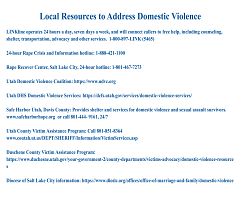October is Domestic Violence Awareness Month

SALT LAKE CITY — “The time has come to condemn vigorously the types of sexual violence which frequently have women for their object and to pass laws which effectively defend them from such violence.”
Pope Francis issued this plea in February, when his prayer intention was “Violence Against Women.”
Although men also can fall victim to domestic violence, in the United States almost twice as many women as men “experience severe intimate partner physical violence, intimate partner contact sexual violence, and/or intimate partner stalking …,” according to the National Coalition Against Domestic Violence website ncadv.org. In fact, “1 in 7 women and 1 in 25 men have been injured by an intimate partner,” the website states.
In Utah, 33.6 percent of women and 21.4 percent of men “experience intimate partner physical violence, intimate partner sexual violence, and/or intimate partner stalking in their lifetimes,” according to NCADV statistics.
Worldwide, the statistics from November 2020 were even more grim: “… each day, 137 women are killed by members of their own family; adult women make up nearly half of the victims of human trafficking identified worldwide; and globally, one in three women have experienced physical or sexual violence at some point (and 15 million adolescent girls worldwide aged 15 to 19 have experienced forced sexual relations). What’s more, last year there was the aggravating factor of the pandemic: the restriction of movement, social isolation and economic insecurity made women globally even more vulnerable to violence in private environments,” according to the Vatican News website in its article on Pope Francis’ prayer intention for February.
In that prayer intention, Pope Francis called not only for prayers for “women who are victims of violence,” but also decried the various types of violence – psychological, verbal, physical and sexual – as “acts of cowardice and a degradation of all humanity. Of men and of all humanity.”
“We must not look the other way,” the Holy Father added.
The February prayer intention wasn’t the first time Pope Francis has addressed domestic violence. He has spoken on the topic several times, including in his apostolic exhortation Amoris Laetitia (The Joy of Love), where he wrote that “Unacceptable customs still need to be eliminated. I think particularly of the shameful ill-treatment to which women are sometimes subjected, domestic violence and various forms of enslavement…” (AL54)
Nor is Pope Francis the only pontiff to address domestic violence. Pope John Paul II, in his 1995 “Letter to Women,” wrote: “Then too, when we look at one of the most sensitive aspects of the situation of women in the world, how can we not mention the long and degrading history, albeit often an ‘underground’ history, of violence against women in the area of sexuality? At the threshold of the third millennium we cannot remain indifferent and resigned before this phenomenon. The time has come to condemn vigorously the types of sexual violence which frequently have women for their object and to pass laws which effectively defend them from such violence. Nor can we fail, in the name of the respect due to the human person, to condemn the widespread hedonistic and commercial culture which encourages the systematic exploitation of sexuality and corrupts even very young girls into letting their bodies be used for profit.”
The U.S. Conference of Catholic Bishops also has addressed domestic violence. In 1992 they published “When I Call for Help: A Pastoral Response to Domestic Violence Against Women;” this document was updated in 2002.
“As pastors of the Catholic Church in the United States, we state as clearly and strongly as we can that violence against women, inside or outside the home, is never justified,” the bishops state in this document. “Violence in any form – physical, sexual, psychological, or verbal – is sinful; often, it is a crime as well. We have called for a moral revolution to replace a culture of violence. We acknowledge that violence has many forms, many causes, and many victims – men as well as women.”
The bishops continue, “The Catholic Church teaches that violence against another person in any form fails to treat that person as someone worthy of love. Instead, it treats the person as an object to be used. When violence occurs within a sacramental marriage, the abused spouse may question, ‘How do these violent acts relate to my promise to take my spouse for better or for worse?’ The person being assaulted needs to know that acting to end the abuse does not violate the marriage promises.”
The bishops also offer suggestions to priests who hear about domestic violence in the confessional, saying in part that the Sacrament of Reconciliation “provides a safe, confidential place for victims to talk about the abuse.
“It presents an opportunity for them to hear a moral voice clearly condemn domestic violence and assure them that they do not have to live in fear.”
The USCCB website also contains links to additional information, sample media posts, a novena for peace in all families, a sample announcement for parish bulletins and prayers of the faithful.
Local Resources to Address Domestic Violence
LINKline operates 24 hours a day, seven days a week, and will connect callers to free help, including counseling, shelter, transportation, advocacy and other services. 1-800-897-LINK (5465)
24-hour Rape Crisis and Information hotline: 1-888-421-1100
Rape Recover Center, Salt Lake City, 24-hour hotline: 1-801-467-7273
Utah Domestic Violence Coalition: https://www.udvc.org
Utah DHS Domestic Violence Services: https://dcfs.utah.gov/services/domestic-violence-services/
Safe Harbor Utah, Davis County: Provides shelter and services for domestic violence and sexual assault survivors. www.safeharborhope.org or call 801-444- 9161, 24/7
Utah County Victim Assistance Program: Call 801-851-8364 www.coutah.ut.us/DEPT/SHERIFF/Information/VictimServices.asp
Duschene County Victim Assistance Program: https://www.duchesne.utah.gov/your-government-2/county-departments/victims-advocacy/domestic-violence-resources
Diocese of Salt Lake City information: https://www.dioslc.org/offices/office-of-marriage-and-family/domestic-violence
© Copyright 2024 The Diocese of Salt Lake City. All rights reserved.


Stay Connected With Us